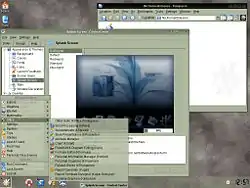CRUX
CRUX is a lightweight, x86-64-optimized Linux distribution targeted at experienced Linux users and delivered by a tar.gz-based package system with BSD-style initscripts. It is not based on any other Linux distribution.[3] It also utilizes a ports system to install and upgrade applications.[4]
 The Crux Linux Logo | |
 Screenshot KDE Desktop for Crux Linux OS. | |
| Developer | Per Lidén and CRUX community |
|---|---|
| OS family | Unix-like |
| Working state | Active |
| Source model | Open source |
| Initial release | December 2002 |
| Latest release | 3.6.1[1] / December 12, 2020 |
| Update method | ports |
| Package manager | pkgutils[2] |
| Platforms | x86-64 |
| Kernel type | Linux (Monolithic) |
| Userland | GNU |
| Default user interface | Openbox |
| License | Various |
| Official website | crux |
Although crux is the Latin word for "cross," the choice of the name "CRUX" itself has no meaning. Per Lidén chose it because it "sounded cool," and ends in "X" which puts it in line with various other Unix flavors such as IRIX, Ultrix, Mac OS X and IBM AIX.[5]
Installation
CRUX does not include a GUI installation program. Instead, the user boots the kernel stored on either a CD or diskette; partitions the hard disk drive(s) to which the operating system will be installed (using a program such as fdisk or cfdisk); creates the appropriate file systems on the various partitions; mounts the CD or NFS share along with the partitions made previously for use by the package installation script; compiles a new kernel; and installs a bootloader, all via shell commands.[6][7]
Package management
CRUX implements an infrastructure similar to that of BSD-based operating systems for package management. Packages consist of a Pkgfile (which is a shell script), any patches required to adjust the program to work, md5sum hashes used to verify the integrity of the downloaded files and a footprint file listing the files to be included in the packages. These files are downloaded from a CRUX software repository, compiled, and installed using the prt-get frontend to pkgutils.[2] The software sources are downloaded from the websites of their respective upstream at the address specified in the Pkgfile.
Releases
| Version | Date |
|---|---|
| 1.0 | 2002 December |
| 1.1 | 2003 March |
| 1.2 | 2003 August |
| 1.3 | 2003 December |
| 1.3.1 | 2004 February |
| 2.0 | 2004 March |
| 2.1 | 2005 April |
| 2.2 | 2006 April |
| 2.3 | 2007 March |
| 2.4 | 2007 December |
| 2.5 | 2008 December |
| 2.6 | 2009 September |
| 2.7 | 2010 October |
| 2.7.1 | 2011 November |
| 2.8 | 2012 October |
| 3.0 | 2013 January |
| 3.1 | 2014 July |
| 3.2 | 2015 November |
| 3.3 | 2017 February |
| 3.4 | 2018 May |
| 3.5[8] | 2019 June |
| 3.6[9] | 2020 December |
| 3.6.1 | 2020 December |
Reviews
Simone Rota reviewed CRUX for OSNews:[10]
Since to use CRUX you must compile your own kernel and modules, the hardware compatibility list is basically the same as the Linux kernel.(2.4.21 on the tested release). No third-party modules are available on the CD, in case of unsupported hardware the only option is to fetch the drivers from another machine. The bootable CD-Rom kernel is compiled with a relatively small set of options, that should be enough to boot the machine and proceed with installation.
Blog, named "The Reviewr", reviewed CRUX 2.2.[11]
References
- CRUX 3.6 Released!
- "The Package System", Handbook, Crux.nu, retrieved January 19, 2013
- Loli, Eugenia. "Interview With the Creators of CRUX and Root Linux". OS News. Retrieved 29 March 2016.
- HomePage, Crux.nu, retrieved January 19, 2013
- "6. Miscellaneous", FAQ, Crux.nu, July 22, 2008, retrieved March 26, 2012
- "Installing CRUX", Handbook, Crux.nu, retrieved March 26, 2012
- "NFSInstall", Wiki, Crux.nu, July 15, 2008, retrieved March 26, 2012
- "CRUX | Main / ReleaseNotes3-5". crux.nu. Retrieved 2020-12-11.
- "CRUX | Main / ReleaseNotes3-6". crux.nu. Retrieved 2020-12-11.
- Review: CRUX Linux, OSNews
- The Reviewr: CRUX 2.2 - Taste matters
External links
| Wikimedia Commons has media related to CRUX. |